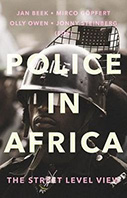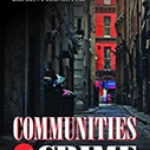Police In Africa: The Street Level View

Editors: Jan Beek, Mirco Copfert, Olly Owen and Jonny Steinberg (2017)
Publisher: Oxford., UK: Oxford University Press, 2017. 392p.
Reviewer: Biko Agozino | March 2018
This book makes some challenging contributions to the knowledge about policing in Africa. The book is structured into three parts (What is the police in contemporary Africa? Who are the Police in Africa? How are the Police doing their work?). Each section has four chapters, and many of the authors appear to be trying to replicate the classic ethnographic methodology of Egon Bittner, The Police on Skid-Row: A Study of Peace Keeping, which is cited repeatedly in the book.
Many of the authors departed from the noun of the title, police, and adopted the present continuous verb, policing, whereas the editors obviously preferred the noun. Chapter one is on ‘Policing Africa: Structures and Pathways’ by Klaus Schlichte; chapter 4 on ‘Policing During and After Apartheid: A New Perspective on Continuity and Change’ by Jonny Steinberg; and chapter 11 is on ‘Policing Boundaries’ by David Pratten. The difference is that policing always goes beyond the police; but this is not clarified in the book. See for example, chapter 5 by Jimam Lar on ‘Historicizing Vigilante Policing in Plateau State, Nigeria,’ which the running head shortened to ‘Historicizing Vigilante Police’ with space to spare for the author’s concept, ‘Policing’.
Some of the authors in the book appear to have conducted their ethnographic research projects as part of their doctoral dissertation research. As with most doctoral dissertations, the editors open the introduction with the assertion that this kind of research in Africa ‘is just beginning’ because ‘Africanist scholarship…has until recently taken next to no interest in public police forces’ (p.1). They go on to explain ‘why the spark has come so late’ to this area of scholarship in Africa and suggest that it may have to do with the shrinking of state institutions, foreign indebtedness, the energy crisis, structural adjustment programs, and the erosion of everyday life that may have prioritized policy research over research interest in the police. This assertion by the editors may reflect the fact that the contributors were not familiar with the criminological literature that has covered policing in Africa, even when criminology did not exist as a discipline in African universities. A simple Google Scholar search reveals that quite a lot has been published on the police in Africa, and so the ‘spark’ may be coming late in the field of anthropology and its ethnographic method, but not in Africa as such. The African Journal of Criminology and Justice Studies has published quite a few original papers on policing in Africa, but the editors were seemingly unaware of them, or they could have invited some of the authors to contribute from African perspectives. Imperial Policing by Phillip Ahire also deserves some mention in a book like this.
The editors of the book acknowledge that the contributors were mainly Europeans, and suggested that this was so partly because African universities do not have many research grants to enable their academics to participate in ethnographic research on the police (p.15). At the time of writing this review, it was being reported in newspapers that the Nigerian Universities Commission had budgeted eight million naira (about 24,000 dollars) for research in 2018, while 81 million naira (about 243,000 dollars) was budgeted for the purchase of cars. The editors hint that ethnographic research is not popular among African researchers (without saying if this is partly because of the association of the ethnographic methodology with intelligence-gathering colonialist anthropology and not just as a function of scarce funding).
African researchers are said to prefer to be hired to conduct consultancy research for Non-Governmental Organizations to produce reports or pieces of ‘grey literature’ that tend not to be published in journals, and therefore are not well known by their European counterparts. Moreover, the contributors to the book are mostly not criminologists, with the exception of the foreword writer. The editors do not explain why mostly anthropologists, historians and political scientists were included as authors, to the neglect of sociologists and criminologists who may be more familiar with the policing literature. The editors admitted that there were limitations to their book that may be overcome by future researchers who could also cover more ground — such as East Africa — that they could not cover in this volume. But I think that the limitations of the book may not be fully addressed simply through this additive method.
A major shortcoming here is the privileging of the methodology of ethnography, without a discussion of the weaknesses of the approach and without any consideration of more critical approaches to understanding policing in Africa. For example, riding along with police patrols is a common criminological approach that has validity threats in terms of the investigator effect on the conduct of the officers, once it is known that they are being observed by European researchers for the purpose of a publication. Though some of the authors examined the effect of masculinity on macho police officers who may feel duty-bound to defend their colleagues (for instance, after the massacre of striking mine workers in Marikana in South Africa), the researchers are mostly silent on the possible effects of white supremacy on the conduct that they were allowed to observe by the mostly black African (not ‘sub-Saharan African’, warns Herbert Ekwe-Ekwe) police officers.
An example of the exceptional awareness of white supremacy is when an officer in Sierra Leone accused his colleagues of having a ‘slave mind’ due to their deference to officers from the UK who were perceived as trying to help the local force after the civil war (Chapter 3 on ‘The Colonial Subtext of British-led Police Reform in Sierra Leone by Erland Groner Krogstad). This slave mind assertion is left unaddressed, when it could have been used to challenge the white supremacy of for example, Hegel and Nietsche, who used the term inappropriately to allude to the enslaved revolutionaries of Haiti who were in fact anything but slavish in their mentality. In the case of Sierra Leone, the natives fought a bitter Hut Tax War of resistance against British colonization in 1898 when the police service of Robert Peel was in its infancy in the UK, but the author in this case is probably not aware of this. Instead, the chapter dismisses any notions of ‘western domination’ as too ‘coarse’ compared to the nuanced concept of ‘subtext,’ even after the British officer expressed uneasiness about doing colonial policing in Africa long after the restoration of autonomy and independence. Perhaps if the European researchers had formed partnerships with critical African researchers and compared their independent observations, or even used participant observation, they may have had a deeper understanding of policing as a neocolonialist controlling practice in postcolonial African societies that exists despite the populist coerced consent that goes with hegemony.
Another problem with ethnography as an empiricist methodology is that the researcher is limited to what is observable, and no amount of ‘thick descriptions’ can replace the need for critical theory construction in support of the struggles to deepen democracy, rather than to seek to simply legitimate an oppressive institution by trivializing endemic corruption as the politics of the stomach, dismissing professionalism and accountability as irrelevant, and insisting on a functionalist analysis of dysfunctional institutional practices that were imposed by colonizers. The latter were intended to facilitate conditions for the exploitation of Africans and for the expropriation of massive surpluses, as Walter Rodney observed in How Europe Underdeveloped Africa, a classic that is not mentioned here even in passing. Of course, the export of functionalist policing research to Africa by European anthropologists remains questionable particularly because of the Orientalist assumption that policing works better in Europe and North America, where the Black Lives Matter Movement and criminological research critical of deaths in custody and of the out-of-order policing of poor whites, ethnic minorities, and indigenous peoples should have alerted the anthropologists to be more critical of the policing of ‘late colonialism’.
There is a tendency in criminology to erase the colonial origins of social control practices like policing, while concentrating research on the imperialist countries of Europe, North America and the settler-colonial locations of Australia, New Zealand, and to a smaller extent, South Africa. In Counter-Colonial Criminology, I suggested that this tendency has contributed to the stunting of the growth of the discipline beyond Europe and North America, while it booms in the former colonizing countries. I concluded that the formerly colonized countries appeared reluctant to institutionalize criminology in their universities because the discipline is probably the field that served colonialism more directly than most social sciences, as it included the technology designed for the control of others. Since the post-colonial locations harbor little or no ambitions of colonizing distant territories, they may see less need to develop this kind of imperialist reasoning in criminology, because western criminologists have tended to exclude post-colonial locations from their research focus while ignoring contributions from outside Europe.
In his ‘Foreword’ to the book, Ian Loader asserts that research on policing ‘remains dominated by US scholarship and weighed towards Anglo-American police institutions’ (p.xiii), because the institutions there are open and more accountable through research, as compared to continental Europe and post-communist Europe, not to mention post-colonial Africa. However, it remains puzzling why such “openness to accountability through research” did not extend to the examination of the brutal methods of policing the colonized that were exemplified in The Wretched of the Earth by Frantz Fanon, referring to the case of French repression in Algeria, and in the classic work by Stuart Hall, et. al., Policing the Crisis, on the case of authoritarian populism that dates back from slavery, through colonialism, to Thatcherism. Neither of these classics is mentioned in this book, as if the authors here are either unaware or perhaps disdainful of their contributions.
Indeed, given that only 0.4% of professors in the UK are black according to recent reports, why is the alleged openness of western scholarship in research on policing and in criminology generally reserved for mainly white male criminologists, while criminologists of African descent and indigenous scholars tend to be denied appointments and research grants that would allow them to participate in holding the late imperialist state accountable in order to further the decolonization of Eurocentric criminology with critical indigenous perspectives (as Chris Cunneen and Jaun Tauri argued in Indigenous Criminology)?
The acknowledgement page of the book notes that the chapters started as workshop presentations in Oxford and Mainz universities in the UK and Germany with public funding. But it seems that hardly any African scholars were invited to those workshops just as no African was invited to the Berlin Africa conference that agreed on the rapacious methodology for the scramble for Africa in 1885. Perhaps collaboration with indigenous authors or interdisciplinary collaborations would have further enriched a book like this, but it may be the case that the individualist ethnographic methodology adopted does not lend itself easily to collaborative scholarship, as colonial anthropologists are known to be very possessive of ‘their fields’ of research. Hence, all the chapters are single authored, with the exception of the introductory chapter.
Overall, the book demonstrates what western scholarship is missing by neglecting to critically cover the terrain of post-colonial Africa, and by marginalizing indigenous scholarship. The book represents a challenge to western scholars to re-examine the complicity of their disciplines in the colonial project in Africa as part of what Claude Ake dubbed Social Science as Imperialism. More critical scholars could depart from the ethnography of the authors to support the demands for reparations that are being raised by people of African descent in regards to the crimes against humanity during slavery and colonialism. One such claim by the survivors of the torture and murder of Mau Mau suspects in Kenya by British colonial police resulted in out of court settlements worth millions of pounds in 2013, while the claim by survivors of the genocide against the Heroro of Namibia by German colonial police is yet to be resolved. Such cases were not even mentioned in the book.
Dr. Biko Agozino is a Professor of Sociology and Africana Studies, Virginia Tech.
FROM THE EDITORS
We invited the editors of Police In Africa: The Street Level View to respond to its review, and this is their response:The review raises many interesting debates and we are glad that our volume has provided more fuel for advancing those. There is however one error and it is the assumption that ‘it seems that hardly any African scholars were invited to’ the publicly‑funded workshops in Oxford and Mainz which began the project; in fact the organisers made sure that African scholars both established and emerging were invited to both, and did participate. Equally while we cannot test the wider assertion that ‘criminologists of African descent and indigenous scholars tend to be denied appointments and research grants’, one of the workshops was in large part built around a grant to facilitate the work of a leading African scholar of policing. Not all of those participants’ work, and equally not all of those of white or non‑African scholars, could be included in the final volume for a wide variety of reasons. We do not apologise for the ethnographic focus of the book; the idea is to attempt a criminology based on documenting the experiences of police officers, rather than taking theory as the starting‑point. We would have liked to incorporate more African scholars in that field but for a number of reasons, including some of the historical trends the reviewer mentions, ethnography is not a popular methodology in many African universities; many of us continue to work with and encourage emerging scholars who do wish to develop their work in that direction.


